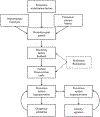Modeling the onset of a depressive episode: A self-regulation perspective
- PMID: 34051582
- PMCID: PMC8528900
- DOI: 10.1016/j.copsyc.2021.04.003
Modeling the onset of a depressive episode: A self-regulation perspective
Abstract
Major depression is an episodic disorder which, for many individuals, has its onset in a distinct change of emotional state which then persists over time. The present article explores the utility of combining a dynamical systems approach to depression, focusing specifically on the change of state associated with episode onset, with a self-regulation perspective, which operationalizes how feedback received in the ongoing process of goal pursuit influences affect, motivation, and behavior, for understanding how a depressive episode begins. The goals of this review are to survey the recent literature modeling the onset of a depressive episode and to illustrate how a self-regulation perspective can provide a conceptual framework and testable hypotheses regarding episode onset within a dynamical systems model of depression.
Keywords: Dynamical systems theory; Major depressive episode; Onset; Review; Self-regulation.
Copyright © 2021 Elsevier Ltd. All rights reserved.
Conflict of interest statement
Conflict of interest statement Nothing declared.
Figures
References
-
-
Nemeroff CB. The State of Our Understanding of the Pathophysiology and Optimal Treatment of Depression: Glass Half Full or Half Empty? Am J Psychiatry. 2020. August 1;177(8):671–685. doi: 10.1176/appi.ajp.2020.20060845. PMID: 32741287.
*A thoughtful and comprehensive update on challenges for understanding the pathophysiology and treatment of unipolar depression, with a particular emphasis on treatment mechanisms of action.
-
-
- Nelson B, McGorry PD, Wichers M, Wigman JTW, Hartmann JA. Moving From Static to Dynamic Models of the Onset of Mental Disorder: A Review. JAMA Psychiatry. 2017. May 1;74(5):528–534. PMID: 28355471. - PubMed
Publication types
MeSH terms
Grants and funding
LinkOut - more resources
Full Text Sources
Other Literature Sources


